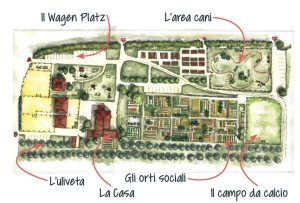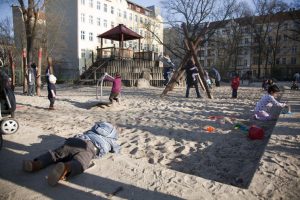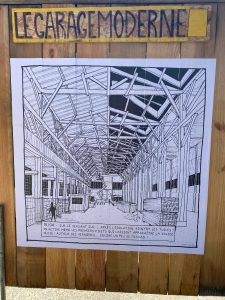This collective house in Via Dazzi, Firenze, on the slopes up to Rifredi, is a historical experience of a student squat that has been essential for various Florentine urban movement initiatives, serving during the years as a community hub, a laboratory, and an organising spot. In recent years it has been transformed in a pilot project of the Tuscany Region for the regeneration of social housing through the work of its inhabitants.
Cecco Rivolta is a house that was occupied by students in the year 2000 primarily for residential use, but it has also held communal spaces and the hacklab / indymedia Italy node since the beginning. Later, they began a social gardening project with their neighbours, as well as a natural kindergarten. Using this property as its headquarters, the collective has promoted significant initiatives, and it served as an important node in the network “Odissey for Space,” which reclaimed space for communal use in Florence in the early 2000s. Tesserae’s researchers have followed the case of via Dazzi since its early steps and presented it as an exemplary case study in the study on Self Recovery of Common Goods for Civic e-State – URBACT.

Chronology
2001 A group of students and precarious workers occupy the house claiming their right to live, to experience a collective and autonomous living dimension. Their motto is ‘a house for us, a living room for everyone’. The house is owned by the University of Florence. Some of the temporary occupants are travellers and live in vans, campers or trucks; they come and go, like clouds. There is always a place for them, because they bring new stimuli and perspectives.
2002 The group consolidates and expands outside the walls of the house, actively participating in the Florentine and national movements, on issues such as housing, schools, information, access to culture, social spaces and aggregation. The ‘Omme’ collective was born on the right to housing in relation to students and young precarious workers, Stampa Clandestina, an experiment in mural counter-information, the ‘Autistici-Inventati’ collective active vanguard on digital rights, privacy and open source. Also worth mentioning is the participation in the global Indymedia network, a protagonist of digital counter-information in the period of the no-global struggles.
2003 They began to rethink and design the green space around the house: social gardens were born following a public assembly. Over the years, the vegetable gardeners have been able to self-manage and weave strong relationships with each other. The first edition of Calci dal Basso (Kicking from Below), a five-a-side football tournament between the movement, the neighbourhood, and all communities, began. The ‘Pista’ dog area is inaugurated, a space designed to make the area more usable for dogs and their owners. Gardeners still harvest their vegetables and organise dinners and barbecues.
2005 Work begins on renovating the house, which was showing structural failure. Part of the roof is fixed and some of the floors are rebuilt. These are years of activity within the Housing Struggle Movement and the Csa Next-Emerson, and where events, evenings, concerts and meetings are organised with the intention of creating a collective legal fund to meet the legal costs of social struggles.
2011 It is the starting point of the house’s self-recovery process. Through a group of urban planners from the University of Florence who thought our experience was interesting, we participated in some international meetings on alternative housing. This relationship made it possible to negotiate a deal that put self-recovery as a real prospect, overcoming the possibility of eviction.
2016 After winning the Tuscany Region’s call for self-help and reaching an agreement with the University, the CeccoRivolta self-managed construction site began.
2020 Renovation works end. The building is now a social housing unit, with a long term contracts for 30 years(?) to 5 households. In the house live 15 adults, 7 kids, 7 dogs, 2 cats.
Link & Download
Download the booklet produced by the inhabitants of Cecco (In Italian)

